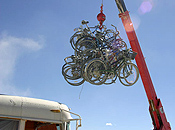In a metropolis of 5 square miles where motorized vehicles operate under extensive limitations, it’s no wonder that bikes are the preferred mode of transportation. Because of threats to bikes like the harsh elements, theft and/or borrowing, and the occasional absentminded misplacement, the Burning Man Project has always encouraged participants to bring only old or low-value bicycles to the event. The downside to this warning, however, is the temptation for participants to leave their expendable bikes on the playa, ignoring the Leave No Trace mantra. Bikes are a necessity in Black Rock City, and they add to the unique spirit of Burning Man. On the other hand, bikes left on the playa after the event, even after years of prevention efforts, are still a problem.
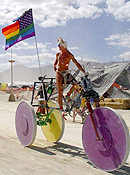 BIKES: THE NEW MUTANT VEHICLES
BIKES: THE NEW MUTANT VEHICLES
Each year more and more participants decorate their bikes, adding to the art of Black Rock City. In 2004, the playa became a canvas for roving bicycle art. Decorating one’s bike not only adds to the artistic flair of the event, but it also makes that unique bicycle more personalized and therefore easier to find and more difficult to steal. Undoubtedly, even more decorated bicycles will grace the playa in 2005.
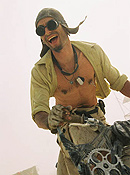 BIKE REPAIR: A PART OF RADICAL SELF-RELIANCE
BIKE REPAIR: A PART OF RADICAL SELF-RELIANCE
Black Rock City simply could not function without bike repair camps and bike mechanics offering their services and expertise. In 2003, an increasing number of participants seemed to begin taking these services for granted. Consequently, in 2004 the Burning Man Project shifted the bulk of the responsibility back to the participants themselves.
The Black Rock Gazette and Survival Guide informed participants that they should get their bicycles playa-ready before coming to Black Rock City. The Project encouraged participants to bring all necessary parts, tools, and equipment for making emergency repairs. Participants were also encouraged to bring tire repair kits and spare inner tubes. (If unneeded, they could be gifted to someone else.) For a larger camp, a designated resident bike mechanic is a good idea.
THE BIKE GUILD AND THE BIKE GODS
For the first time since 1997, Center Camp did not contain a public bike repair camp in 2004. Bike repair camps did set up shop in the 3 and 9 o’clock plazas. As part of the effort to curb the rise of participants taking bike repairs for granted, the Project supported the creation of the Bike Guild as an alternative. Located in Center Camp, the Guild functioned as a place where participants could borrow tools and learn how to fix their own bikes from the expert advice of the ‘Bike Gods.’
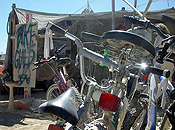 The Bike Guild threw a keg party on the first day of the event as a way of recruiting Bike Gods to volunteer their services and time in the Guild. Participants were also welcome to visit and learn about how the Guild works. The Guild was an overall success. Throughout the week, volunteer Bike Gods empowered participants to fix their own bikes using spare parts mostly donated by other participants.
The Bike Guild threw a keg party on the first day of the event as a way of recruiting Bike Gods to volunteer their services and time in the Guild. Participants were also welcome to visit and learn about how the Guild works. The Guild was an overall success. Throughout the week, volunteer Bike Gods empowered participants to fix their own bikes using spare parts mostly donated by other participants.
BIKE THEFT
Magical as it is, Black Rock City unfortunately has some of the negative traits of other cities, such as bicycle theft. Locating a stolen bicycle in Black Rock City is a rather difficult challenge especially when the bike reported stolen turns out to have been merely borrowed by mistake or simply misplaced. To further complicate the issue, under Nevada law, a law enforcement officer has to witness a bike being stolen before taking action against the thief. In 2004, however, the Black Rock Rangers were able to thwart one would-be criminal caught in the process of stealing multiple bicycles.
With these limits on action by law enforcement personnel and the Black Rock Rangers, the responsibility to prevent bike thefts lies on the residents of Black Rock City themselves. The easiest way to fulfill this role is to bring and use a bike lock on the playa.
As a violation of Leave No Trace principles, abandoning a bicycle on the playa is just as offensive as leaving a pile of trash. Both require someone to remove the mess from the playa in order to return the Black Rock Desert to its natural state and satisfy the requirements of Burning Man’s permit from the Bureau of Land Management. In addition to hauling trash to landfills, in recent years the Department of Public Works has also been forced to spend time removing and dealing with large numbers of abandoned bicycles, some in perfect condition.
Some have been recycled by participants who have lost bikes; either by misplacement or to thieves. Others became property of Gerlach High School and the Bike Hut (a not-for-profit bike cooperative in San Francisco). Unfortunately, the rest of the abandoned bikes were hauled to the dump in Reno. A goal for next year will be to find virtually no abandoned bicycles at the close of Burning Man 2005.
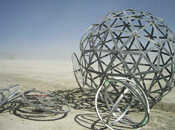 Black Rock City is arguably one of the most bike-friendly municipalities in the world. Taking personal responsibility for repairs, theft prevention, and safety – as well as artfully decorating bikes – will enable all of us to help make Black Rock City even more of a bike utopia in 2005.
Black Rock City is arguably one of the most bike-friendly municipalities in the world. Taking personal responsibility for repairs, theft prevention, and safety – as well as artfully decorating bikes – will enable all of us to help make Black Rock City even more of a bike utopia in 2005.
Submitted by,
Ray Allen


